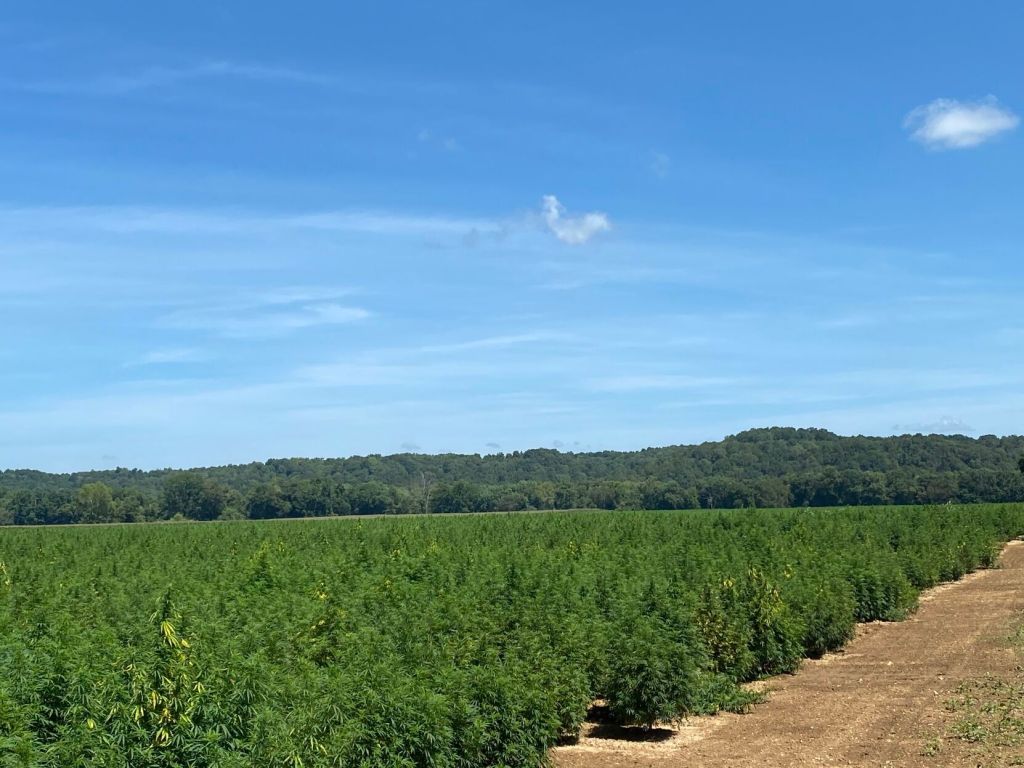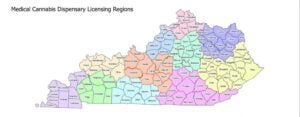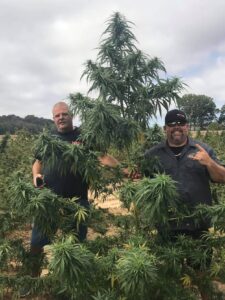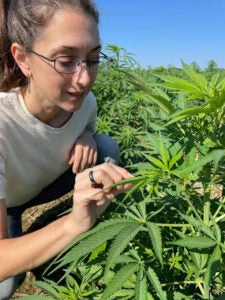‘We’ll see what happens:’ Medical marijuana rollout elicits frustrations
Published 9:39 am Monday, July 8, 2024

- A field where hemp is grown at Sky Extracts, a Bowling Green company. (Courtesy of Curtis Butler)
In less than six months, medical marijuana will be legal in Kentucky. But a week after business applications opened, prospective applicants shared frustrations with the rollout.
Over a decade after the first medical cannabis bill was filed in the Kentucky legislature, it finally passed in 2023. The General Assembly gave itself an extra year to establish regulations for the new industry, and on Jan. 1, 2025, Kentuckians with specific medical conditions will be able to legally obtain medical marijuana.
Qualifying conditions include PTSD, cancer, epilepsy, multiple sclerosis and chronic pain.
How does the application process work?
On July 1, prospective medical cannabis business owners could begin applying for a business license.
To avoid an oversaturated market, there are limitations on how many licenses are available for the different types of businesses: cultivators, processors, safety compliance facilities and dispensaries. There are 48 available dispensary licenses, divided into 11 regions to ensure equal access across the Commonwealth.

Medical cannabis licensing regions
“We saw through hemp, if you don’t grow it appropriately, and you create too many licenses too early, you can bankrupt a lot of businesses,” said Gov. Andy Beshear at a post-session presser.
An October lottery will decide who gets a license and who doesn’t. In January, cardholders can legally obtain medical cannabis.
License holders must grow, process and producer all medical cannabis within Kentucky borders.
Local governments also have a say in the matter. Counties and cities can “opt out” by passing ordinances banning medical cannabis businesses within their borders. They can also put the issue on the ballot to let the people decide.
If local governments pass ordinances before the end of the year, then businesses cannot locate there. However, if local governments wait until 2025 or later to pass an ordinance, already-established businesses are grandfathered in.
So far, nine counties and 10 cities have opted out. Eight counties, including Butler and Logan counties, have put the question on the November ballot, as well as four cities, including Franklin.
The medical marijuana lottery: ‘You got to play it to win’
Before he lost his mother to cancer in 2013, Southern Kentucky Hemp owner and operator Curtis Butler didn’t know much about the industry.
But since, he said the medical testimonies he’s heard have been “unbelievable.”

Richard Adamson (left) and Curtis Butler, operator at Southern Kentucky Hemp, pose next to a plant. (Courtesy of Curtis Butler)
“I’ve watched it, with the hemp side of it, treat anything from a two-year-old epilepsy patient to a 75-year-old dementia patient,” Butler said. ” … I’m super glad that we’re finally getting on this. There’s a lot of supporters out there, along with a lot of medical needs that need it.”
Butler is applying for a cultivator and processor license. He’s building a lab in Bowling Green intended to extract the oils needed for medical use.
Kentucky’s program prioritizes Kentucky hemp farmers, who have been vetted by the Kentucky Department of Agriculture.
Many Kentucky farmers with high hopes for the hemp industry lost their farms after the market became oversaturated, Butler said.
“Hopefully we’ve learned from that moving forward,” he said.
Butler expects a high volume of applications. Regardless of who wins, he said he hopes everyone can work together to pull this new Kentucky product off.
“I’ve never personally played the lottery,” he said. “They say you got to play it to win. I’ve never been much on the lottery, but we’ll see what happens.”
Ginny Saville, owner of The Botany Bay since 1997, also plans to apply. She owns smoke shops in Lexington and Richmond.

Ginny Saville, owner of The Botany Bay smoke shops in Lexington and Richmond, serves a customer. (Courtesy of Ginny Saville)
She’s worked on policy issues and was in Frankfort when the first medical marijuana bill was filed over a decade ago. She’s stayed in Kentucky instead of chasing the business elsewhere because she cared about making the change here.
Saville feels like her and handful of others have “earned” a license through their efforts to create an environment where medical cannabis is possible.
“I’ve been working for almost 30 years for this, and to have it boil down to pulling a number out of a hat is pretty damn unfair to be honest,” she said.
Cost and government hesitations
Katie Moyer isn’t sure if she’ll apply for a medical cannabis business license. As President of the Kentucky Hemp Association and owner of Kentucky Hemp Works, Moyer has been around since 2014, when she became the state’s first private hemp grower since World War II.
But she has some concerns about the medical cannabis rollout.
Moyer worries that the startup costs may make the industry inaccessible to small businesses. It costs $5,000 to apply, and applicants must prove they have between $50,000 and $500,000 for startup expenses, depending on which type of business they want to establish.

Katie Moyer, founder of Kentucky Hemp Works and President of the Kentucky Hemp Association, studies a hemp plant. (Courtesy of Katie Moyer)
While that’s “not unattainable,” Moyer said it could allow bigger corporations to buy more lottery tickets and “stack the deck.”
“So what chance do small businesses really have besides minuscule, Vegas-style odds of winning a license in the lottery?” she asked.
Moyer’s also hesitant to trust that the government will continue to support medical cannabis. She’s seen agencies raid stores because they were selling CBD gummies. Even after the business owners won their court battle, they’d already lost valuable inventory and time.
“Every time one of these cannabis industries gets successful, the government panics and worries that people might be using too much cannabis,” Moyer said. “So they find ways to restrict it.”
Weed by January? An uncertain timeline
The state will grant licenses in October. Since all cannabis must be grown and processed in Kentucky, license holders have three months to produce a product before cardholders can legally obtain it.
That’s unrealistic, Moyer said.
Curtis agreed, saying he doesn’t expect dispensaries to be open until at least spring.
Saville thinks it might be even later. Business owners must consider the months they will incur expenses without income in their decision to apply, she said.
“I would think that the very early days that we would see products would be maybe June, but probably more like July or August of next year,” she said.

